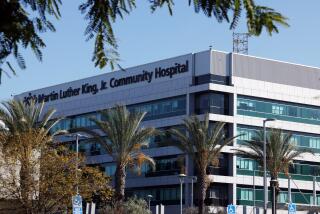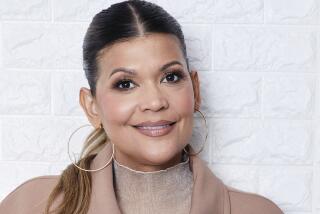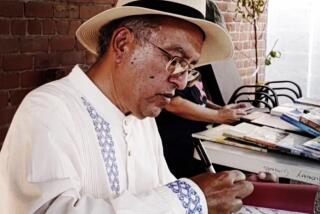Two ERs, two very different outcomes
EDITH ISABEL Rodriguez and I have something in common. She died of a perforated bowel because of cruel indifference at the Martin Luther King Jr.-Harbor Hospital emergency room. I survived a perforated bowel because of merciful competence in the Arcadia Methodist Hospital emergency room.
I will not soon forget the day -- or the date, either. It was 9/11/2003. I was at home and had taken a laxative in preparation for a routine colonoscopy. I’d had some slight abdominal pain, but a nurse had advised me, casually over the telephone, that because that pain had been tentatively diagnosed as prostatitis, proceeding with the scheduled colonoscopy shouldn’t present a problem. Unfortunately, what I really had was diverticulitis, a kind of bowel inflammation. As the laxative took effect, my bowel “blew out” like a tire at the spot of the inflammation.
The pain was so extreme that I was barely able to stagger to the telephone to call 911. Fortunately, the experienced paramedic I was quickly put in contact with knew just what to say. “Lie down at the door to your house,” he said, “and leave the door open, so we can find you fast.” They found me, and fast, and took me to Arcadia Methodist Hospital, where morphine and other medications brought down the screaming pulse rate that, as I overheard in the ambulance, had the paramedics worried.
Just over a day later, in the splendidly competent hands of Dr. Bengt Pehrsson, the destroyed section of my colon was cut out. Below the excised section, my colon was tied off. Above it, the colon was redirected through a hole cut in my abdomen -- a colostomy. Three months later, after the necessary internal healing, a “resection” put me back together, and I have been as good as new ever since.
How different my experience was from Rodriguez’s. When my ordeal began, my wife -- unlike poor Jose Prado, frantically trying to find someone, anyone, at King-Harbor or elsewhere who would attend to his girlfriend -- only had to hurry to Arcadia Methodist and ask to see me. Unlike Rodriguez’s three orphaned children, my daughter did not lose a parent at a time when she needed him more than ever.
It is not my place to inquire into what strange prejudice may have contributed to Rodriguez’s untimely death, or what measures should now be taken to save King-Harbor hospital. What I do know is that the paramedics who rescued me had the choice of two nearby, excellent emergency rooms: Arcadia Methodist and Pasadena’s Huntington Memorial, another local ER for whose services my entire family has had reason to be eternally grateful. If King-Harbor’s emergency room closes, the thousands of desperate and suffering people it serves every month will have no nearby emergency room. They will be forced to make their way through ever-worsening Los Angeles traffic, to far-distant ERs that are even now bracing for a wave of new, uninsured patients.
This is the final lesson of this excruciating and avoidable death. Whatever culpability should be assigned the directly involved staff members at King-Harbor, there is, clearly, a deeper indictment to be made of a healthcare delivery system that for some performs so spectacularly well and for others so abysmally. The thought of Rodriguez writhing in agony, as I did on my kitchen floor -- of her last moments on this Earth as an experience of cruelty rather than mercy -- will not leave me soon. A society that allows this, when it could so easily do better, has much to answer for.






